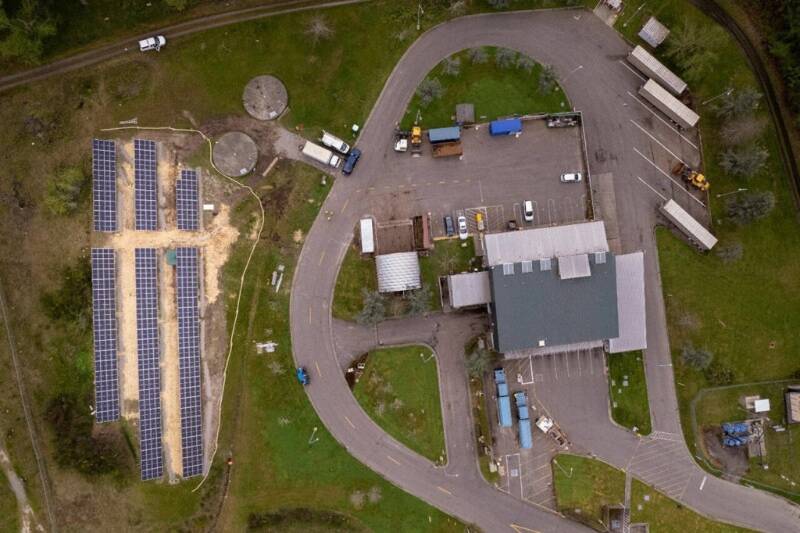You’re an environmentally responsible Vashonite, so when your home recycling bins are overflowing, you dutifully load everything into the back of your vehicle and head to the Vashon Transfer Station.
Once there, you haul your several weeks’ worth of recycling across the parking area and dump it into the large compacters. It doesn’t take long, and the service is free. And then you’re on your way, satisfied that you’ve done your bit for the environment today.
But do you ever wonder what happens to all that stuff after you drive away?
How, for example, is it sorted? Does some anonymous guy sift through the mix of all that cardboard, paper, plastic, glass jars and metal cans, or is it somehow done automatically by a machine? How much recycling goes through the Vashon Transfer Station every year? And where does it all ultimately end up?
Curious about the process, I posed these and other questions to Annie Kolb-Nelson, Communications Manager at King County’s Solid Waste Division.
Last year, the station — which opened in 1999 and is currently staffed by three employees — accepted more than 2,000 tons of recycling. In the fee-free section of the facility, this included cardboard (153 tons), mixed paper (249 tons), glass bottles and jars (142 tons), metal cans (316 tons), and plastic bottles, jugs and tubs (66 tons). The station also took in more than 1,000 tons of yard waste, as well as various other items on a fee basis (e.g. CFC appliances, mattresses, mercury lights and textiles).
Recyclables are managed by private companies that partner with King County. From Vashon, they’re transported to a “Materials Recovery Facility”, where they undergo an initial sorting — yes, manually. There really are workers who do this!
After that, materials are transferred to a system of conveyer belts and optical scanners that automatically sort and separate them. From there, they’re baled and sent to the various local, national or international processors that make recycled-content products.
Despite the common perception that a lot of recycling goes to China, in actual fact most of the buyers are in North America. That said, the market for paper and cardboard is volatile, and in recent years it has fluctuated between our continent and Southeast Asia.
Reusable materials (such as textiles) are donated to non-profit organizations, and yard waste is sent to another partner, Cedar Grove in Maple Valley, to make compost.
Not all of the material that ends up at the Transfer Station is acceptable: somewhere between 1.5% and 6% is not sent to end markets for repurposing. The most common reasons are what you’d expect: items are rejected because they’re contaminated or dirty, or because they were never recyclable in the first place. Fluctuations in global markets can also dictate what is or isn’t acceptable at any particular time.
How clean should your recyclables be? Not quite as clean as you might think: one materials processor notes that it’s not necessary to aggressively wash out recyclables, so long as you’ve scraped them mostly clean, and given them a quick rinse.
Vashon residents, it turns out, are among the more environmentally aware citizens in the region, but for the County overall it’s estimated that a staggering 70% of material that finds its way into the landfill could have been reused, recycled or composted.
To address this problem, last year King County launched a program called “Re+,” which aims to return valuable materials to the economy and reduce greenhouse gas emissions created by the region’s waste system.
On Vashon, the county is also working to make the facility more sustainable, through installation of solar panels and more efficient energy use. King County is also partnering with Zero Waste Vashon to potentially set up a facility to process organic waste on the island. They’re also planning on expanding options for composting at the Transfer Station.
One set of items that you currently can’t recycle on Vashon is loose (sheet) plastic and plastic bags. If you want to recycle these, your options are to take them to the County facilities at Shoreline or Bow Lake (which also accept styrofoam). Another option— at least according to the City of Seattle, which manages waste separately from King County — is to take them to various retailers in the city such as Safeway, QFC, or Fred Meyer.
A comprehensive guide to the do’s and don’ts of recycling is available here. It’s worth a few minutes of your time to refresh your memory regarding which items you can — and can’t — take to our island’s Transfer Station.
Phil Clapham, a frequent contributor to The Beachcomber, holds a Ph.D in zoology and is an expert on large whales.


